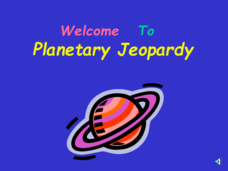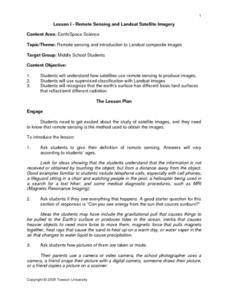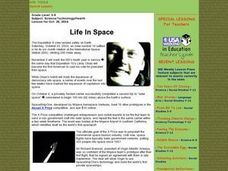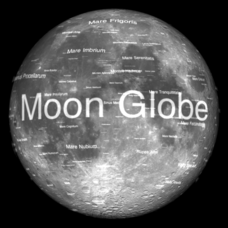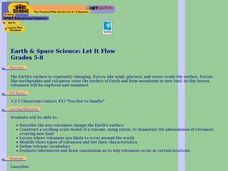Curated OER
"101 Amazing Earth Facts" Game
Students read for comprehension, work cooperatively to learn "101 Amazing Earth Facts," and compete as teams in a Jeopardy-like game.
Curated OER
Volcanoes in Space
Students research volcanoes on the Internet to compare/contrast the volcanoes on Earth to the ones found on Io, a moon of Jupiter. Students list the similarities and differences in science journals, and illustrate pictures of the volcanoes.
Curated OER
Solar System Hall Model
Not novel, but fun, this lesson gets your space science learners to model the size of the planets and the solar system along your school's hallway. Scaled measurements as well as actual distances are provided for both planet diameters...
Curated OER
Space Exploration to Find Habitable Planets
Students explore space science by reviewing scientific vocabulary terms. In this planet identification lesson, students identify the nine planets in our solar system and discuss which ones could potentially harbor life at some point....
Curated OER
Hello, Is Anybody Out There? (cont.)
In this space science worksheet, students read an informative passage about radio waves and the possibility of sending messages in space. The passage describes a "Sounds of Earth" record on the Voyager satellite which contains messages...
Space Awareness
Climate Zones
The climate at the equator is hotter than the climate at the poles, but why? The lesson goes in depth, explaining how the angles of illumination relate to the heating rate at different latitudes and seasons. Scholars use a strong lamp,...
NASA
Space Images
As technology advances, so does our understanding of the universe around us. Thanks to the Hubble Telescope, Mars rovers, and other high-resolution cameras, there are amazing photographs of celestial bodies, planets, comets, and more...
Curated OER
Orbital path of Landsat
Students comprehend how Landsat satellites orbit teh Earth to produce images. They comprehend the elliptical path of satellites. Students recognize that a different orbital path is needed for different satellites to perform their tasks....
Curated OER
Planetary Jeopardy!
Space Science can be so much fun, especially when you play Planetary Jeopardy! This game tests students on what they know about Roman Gods, the planets and moons in our solar system, and the Earth's rotation.
Curated OER
Remote Sensing and Landsat Satellite Imagery
Middle schoolers comprehend how satellites use remote sensing to produce images. They use supervised classification with Landsat images. Students recognize that the earth's surface has different basic land surfaces that reflect/emit...
Curated OER
Life In Space
Students figure out how to design their own space station. They take a tour on the International Space Station to see what living there is really like, and how lessons learned on the ISS help pave the way for future space tourists.
Curated OER
Exploring Space Fact
Students visit web sites to gather information about space and space exploration.
NASA
NASA
Everything you have ever wanted to know about our solar system, space exploration, and more can be found here. Be prepared to clear your schedule; you will be sucked into the app like a star into a black hole.
Midnight Martian
Moon Globe
Not just a simple globe of the moon, this interactive version allows you to choose lighting according to the location of the sun, views from different positions on Earth, and more! Satellite images and topographic data have been combined...
University of Wisconsin
Measuring Slope for Rain Gardens
The slope of the land is an important feature when considering the erosion that will occur. In this resource, which is part of a rain garden unit, learners calculate the slope of the proposed garden site. Even if you are not planning a...
NASA
Soda Straw Rockets
Three, two, one, blast off to a better understanding of force and motion with this exciting science lesson! Beginning with a discussion about rockets and gravity, young scientists go on to complete a series of worksheets about net...
Curated OER
Earth Clock- A Timeline, Past to Present
Students create an earth clock. In this earth clock lesson, students create a clock which serves as a timeline of the history of the earth from 4.567 billion years ago to present day.
Curated OER
Earth, Moon, Mars Balloons
Students demonstrate size and orbits of Earth, Moon, and Mars. For this space science lesson plan, students will use balloons to show how the size and distance between the planets and satellite compare.
Curated OER
Spaceship Earth
Students study the earth as a system, and the fragility of that system when population, and pollution, are considered as interactive parts of earth.
Curated OER
Spuds in Space
Students explore the effects of velocity on an object when it collides with another object. They design and outfit a potato astronaut in a spacesuit to withstand the hazards of high velocity impacts from space debris and meteoroids.
Curated OER
Earth's Poles
In this Earth's Poles learning exercise, students survey, examine and dissect the North and South Magnetic Poles, the Earth's axis and summarize the Aurora legends. Students research six directives involving space weather and predicting...
Curated OER
Earth and Space Science: Let it Flow
Students engage in a lesson in which volcanoes be explored and examined. After watching a video, students create volcanoes out of clay.
Laboratory for Atmospheric and Space Physics
Jupiter’s Relative Size
How do you properly illustrate the extreme size difference between two planets—Earth and Jupiter? With the help of jellybeans, of course! Create a scale model of Jupiter's mass compared to Earth using a fishbowl, 1,400 beans, and a...
Journey Through the Universe
How Far is Far?
The earth only revolves around one thing — and it's not any of your pupils. The instructional activity includes two activities dealing with the distance to the sun and the moon. First, scholars create a pin hole camera and use the rules...








